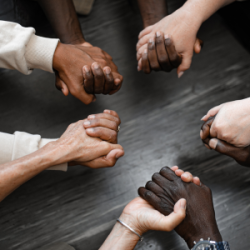It's only a social gathering. Those people in there are your friends—or potentially your friends. You're smart enough, you're good enough, you're good-looking enough to fit in. So why do you stand outside the door with the same sensation as Indiana Jones contemplating a tomb full of snakes?
Because you're an introvert, and in a world that seems to value the garrulous and the social above all, you sometimes feel deformed in some way—as though you're not fully human, or at least, not human in a way that others seem to appreciate. You don't like shouting out answers, you don't like collaboration, you don't like speaking up before you've thought through a response.
I know this feeling, believe me—although I am a teacher, preacher, and public speaker, I would rather prepare a dozen sermons than stand in one receiving line, and although in front of an audience I can be calm, funny, and perfectly at ease, in a room where I have no defined role, I'm uncomfortable, checking my non-existent watch, wishing I were at home watching Friday Night Lights. Like TIME's Bryan Walsh, I have hid from people in bathrooms, and I expect I will do so again soon.
On the Myers-Briggs Personality Test, I am an INFJ with a strong "I" for introversion, and I do my best work alone, in my own head, although I have to interact with people who are strong "E"s, and live my life in a world where I am expected to conform and perform like classic extroverts.
That's why Susan Cain's Quiet is so important. A third to a half of us, she reports, are introverts, and yet our schools, our businesses, and yes, our religious institutions are set up on the model that all of us are extroverts. If you've ever lamented being put in a team, ever told you need to develop your "people skills," ever felt like you weren't being heard because you didn't speak up immediately, ever felt out of place in a rally, self-help presentation, or emotive church service, then you understand how misshapen it can make you feel when you're expected to fit a single outgoing mold.
Cain looks at seminal American institutions, from Tony Robbins to Harvard Business School to Saddleback Church, inserting her own introverted self into those settings and talking about what people gain and lose when they're forced into one way of doing things. She describes her conversation with introverted minister Adam McHugh, who tells her that in the evangelical culture, "The emphasis is on community, on participating in more and more programs and events, on meeting more and more people." (66) I know many priests and pastors who have to function as extroverts but are actually introverts --and I recall my childhood terror of being told I was supposed to witness to people about my faith. Even something as simple as the before-service routine in my Episcopal Church, where we are expected to introduce ourselves or welcome the people around us, plays into an extrovert model.
As in business and education, religious superstars are expected to follow an extroverted model. This is true in more than just the evangelical church, as Cain reports. But it seems to indicate a complete lack of understanding of how the gifts of the introvert can enrich the Church and the world. Someone who can make a stranger feel welcome in a worship service is a blessing; so is someone who can think long and deeply and help someone else think about God, peace, or social justice.
Introverts, as Cain points out, have contributed amazing things to the world. We include Rosa Parks, Isaac Newton, Steven Spielberg, J. K. Rowling, Al Gore, Gandhi. (5-6) If we're given the chance to do what we do well—in the ways we do them well—we have so much to offer. Yet, Cain argues, in American life, many of the most important institutions are still designed for those "who enjoy group projects and high levels of stimulation." (6)
Quiet is a gift to the tribe because it offers copious research and accumulated experience that things can, and should, be different. So whether in business, education, religion, or any institutional setting, Cain's book suggests to us that we need—as a culture—to make a place for the different ways people work best in social settings, think best, and feel most comfortable.
As a teacher, maybe I need to balance the quick and sure responses of my extroverts with the more-nuanced and sometimes hard-coaxed answers of my introverts. As a business owner, perhaps you need to reevaluate the putting of people in competitive teams, or offer your introverts some solitude where they can think hard without interruption. As a priest or church leader, perhaps you need to retrain your congregation about how to make all feel welcome—or to re-train them to value the focus and creativity introverts bring to the community as well as the friendliness and outgoing nature of the extroverts.





